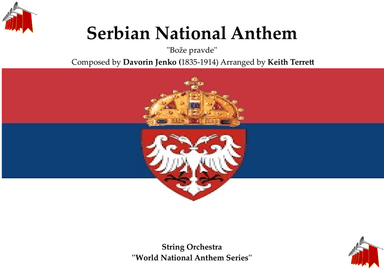Unavailable
Marš na Drinu is currently unavailable
We can no longer provide this arrangement through Sheet Music Stores. The listing stays online so you can learn about the piece and explore alternatives.
Try these next steps
- Discover similar sheet music curated for you below.
- Search for “Marš na Drinu” across our catalog.
About this arrangement
Drum Set,Trumpet,Tuba,Viola - Level 3 - Digital Download SKU: A0.1349551 Composed by serbian folk song. Arranged by Zoran Radanovic. Contest,Festival,Film/TV,Folk,Patriotic,Wedding. 9 pages. Zoran Radanovic #934310. Published by Zoran Radanovic (A0.1349551). This famous serbian folk song is for quartet (Bb trumpet, tuba, viola and drumset) with set of parts.The "March on (or to) the Drina" (Serbian Cyrillic: Марш на Дрину, romanized: Marš na Drinu, pronounced [mârʃ na drǐːnu]) is a Serbian patriotic march which was composed to commemorate the Serbian victory in Battle of Cer during World War I and came to be seen as a symbol of Serbian resistance and victory in the World War I. Along with the other World War I song, Tamo daleko, it became a powerful symbol of Serbian culture and national identity and remains popular amongst Serbs in the Balkans and the diaspora.[1][2]Der Marsch auf die Drina (serbisch Марш на Дрину Marš na Drinu) ist ein Lied aus Serbien, das im Ersten Weltkrieg entstand. Der Komponist war Stanislav Binički (1872–1942). Geschichte Vom 16. August bis zum 19. August 1914 fand am bosnischen Grenzfluss Drina die sogenannte Schlacht von Cer statt. Die serbische Armee konnte diese für sich entscheiden. Der Sieg der Serben über die zahlenmäßig überlegenen österreichisch-ungarischen Gegner war der erste Sieg der Alliierten über die Mittelmächte im Ersten Weltkrieg. Zu Ehren der Gefallenen komponierte Stanislav Binički den „Marsch auf die Drina“, ein Lied, das zu einem Symbol der Tapferkeit der Serben während des Ersten Weltkriegs wurde. Er widmete den Marsch Oberst Milivoje Stojanović, der in der Schlacht von Cer gekämpft hatte und der einige Monate später in einer anderen Schlacht fiel.Marš na Drinu (izvorno: Na Drinu), je srbijanski domoljubni marš. Napisao ga je za vrijeme Prvoga svjetskog rata skladatelj i dirigent Stanislav Binički, u čast pobjedi srpske protiv austrougarske vojske u Cerskoj bitci, u Prvom svjetskom ratu, vođenoj od 16. do 19. kolovoza 1914. godine. Stanislav Binički bio je sudionikom te bitke kao vojni kapelnik. Pjesma je 50 godina bila bez riječi, a 1964. godine stihove je napisao srbijanski književnik Miloje Popović.[1][2] Pjesma "Marš na Drinu" dobila je najviše glasova za srbijansku himnu na referendumu o državnim simbolima Republike Srbije 1992. godine, ali je referendum poništen zbog nedovoljnog odaziva glasača, tako da je pjesma ostala neslužbena himna Republike Srbije sve do 2004. godine i proglašenja pjesme "Bože pravde" himnom Repubilke Srbije This product was created by a member of ArrangeMe, Hal Leonard's global self-publishing community of independent composers, arrangers, and songwriters. ArrangeMe allows for the publication of unique arrangements of popular titles and original compositions from a variety of voices and backgrounds. The length, difficulty, and retail pricing are determined solely by the discretion of the person who arranged or composed it. About Digital Downloads Digital Downloads are downloadable sheet music files that can be viewed directly on your computer, tablet or mobile device. Once you download your digital sheet music, you can view and print it at home, school, or anywhere you want to make music, and you don’t have to be connected to the internet. Just purchase, download and play! PLEASE NOTE: Your Digital Download will have a watermark at the bottom of each page that will include your name, purchase date and number of copies purchased. You are only authorized to print the number of copies that you have purchased. You may not digitally distribute or print more copies than purchased for use (i.e., you may not print or digitally distribute individual copies to friends or students).
Related sheet music

Game Of Thrones
ramin djawadi

Get This Right (arr. Amphibia Cultural Legacy)
robert lopez, kristen anderson-lopez, amphibia cultural legacy

Imagine
john lennon, david catherwood

Serbian National Anthem for String Orchestra (MFAO World National Anthem Series)
keith terrett

Danse macabre, op. 40
camille saint-saens

Marš na Drinu - March on the Drina (arr. Zoran Radanovic)
zoran radanovic, serbian folk song

Something
george harrison

When I'm Sixty-four
john lennon, paul mccartney, david catherwood
